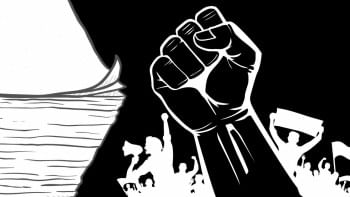To protect free speech, get rid of oppressive laws like the CSA

The Cyber Security Act (CSA), 2023 is widely accepted as a draconian spin-off of the Digital Security Act (DSA), 2018. Hastily passed a few months before the Parliamentary Election of 2024, the CSA carries the same repressive watermarks of the DSA, which was also passed just before an election. The purpose of this law is widely recognised as suppressing the free press and freedom of speech. As a nation in transition, Bangladesh must repeal the CSA to safeguard the rights of its citizens.
All but the most loyal supporters of the Awami League would agree that during its reign, Bangladesh suffered a massive decline in freedom of speech. The World Press Freedom Index ranked Bangladesh 165th out of 180 countries in the 2024 report, placing it at the bottom among South Asian nations, only above Afghanistan. While many factors contributed to this decline, one of the main suppression tools was the CSA and its predecessor.
National and international media, activists, and legal experts strongly opposed non-bailable offenses which existed in the DSA. Unfortunately, the same spirit continued in the CSA, as any offence booked under sections 17, 19, 27 and 33 of the act were declared to be non-bailable.
Section 4 of this act restricted the possibility of anyone criticising the government, even outside of Bangladesh. Unilateral power is given to the Director General of National Cyber Security Agency in section 4, to remove or block any content with the assistance of BTRC.
Section 21 outlines a five-year jail term and/or a Tk one crore fine for any statement, conspiracy, or negative criticism against the Liberation War, the father of the nation, the national anthem, and the national flag, allowing law enforcement to package any form of criticism against the government as anti-state or anti-government and prosecute ruthlessly. Section 25 further doubles down on so-called conspiracies to spread propaganda and falsehoods that affect the image and reputation of the country. The wording of this clause was purposefully kept vague to allow arbitrary interpretation.
Section 42 grants police absolute authority to search bodies, places, confiscate, and arrest without showing any cause or warrant. The former ruling government has been heavily criticised for using this clause as a major fear tactic. Many journalists have refrained from saying or writing anything against the government out of fear of police harassment and brutality.
The extent to which the CSA strangled rights and voices is astonishing and disproportionate. When the law of the land allows accused individuals to get bail for serious offenses, such as loan default, cheque fraud, and land grabbing, how can authorities detain someone without bail for something as harmless as a Facebook post? This law intentionally targets journalists, netizens, and ordinary citizens, tarnishing freedom of speech, expression, and investigative journalism. No authority, either private or public, should be allowed such unchecked power to search, detain, or punish people.
Although the previous regime is gone, the law remains in force, and many of its victims are still behind bars. Between October 2018 and September 2023, 4,520 people were charged in 1,436 cases. The Centre for Governance Studies (CGS) traced identities of the accusers in 859 cases and found that the former ruling party activists filed 263 of them, suing 887 people.
Victims who have been unjustly detained, tried, and convicted should be immediately released. Independent judicial investigation should be conducted and personnel who were involved in framing innocent citizens must face the law.
The CSA must be repealed, and the interim government must form an impartial committee consisting of legal experts, journalists, cyber security experts, and activists to draft a new act. The new act should only focus on cybercrimes such as fraud, theft, hacking, or any action that compromises national cyber security. Any online activities of anti-state or anti-national nature can always be addressed under penal code and other existing laws. Speech, online activism, and all forms of journalistic and creative expression must be excluded from the scope of the future cyber law.
For the first time in many years, there is an environment where publishing an article or a Facebook status doesn't make us feel scared. Online news portals are posting materials and incriminating evidence that were practically impossible just a few weeks ago. Television and print media have also come out of their shells, deviating from their once established party lines. These are steps in the right direction, but the fruits of freedom should not appear circumstantial in the long term; they should be structural.
Years of faulty laws have strangled citizens' voices, to an extent that self-censorship has become our second skin. The youth of the country have obviously spoken, and leveraging on that, the existing legal system should be modified so that the common Bangladeshi can speak freely, too. We must dispel the oppressive legal instruments of the past and enact better laws, so that future governments cannot senselessly prosecute its own citizens, much like the last one did.
Sinha Ibna Humayun works in technology and is an advocate of freedom of speech. He can be reached at [email protected]
Views expressed in this article are the author's own.
Follow The Daily Star Opinion on Facebook for the latest opinions, commentaries and analyses by experts and professionals. To contribute your article or letter to The Daily Star Opinion, see our guideline for submission.

 For all latest news, follow The Daily Star's Google News channel.
For all latest news, follow The Daily Star's Google News channel. 










Comments